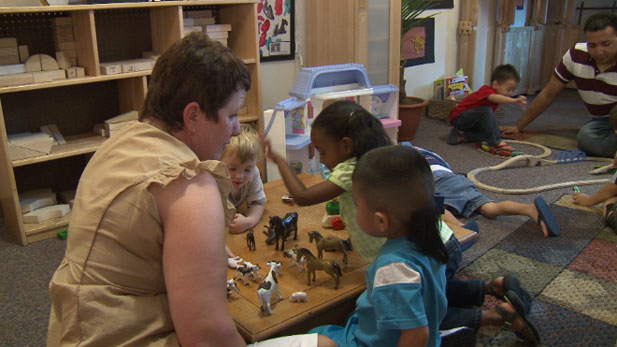 In an effort to bridge the budget gap, the state legislature has placed an initiative on the November ballot, one that would divert money voters approved to fund early childhood education.
In an effort to bridge the budget gap, the state legislature has placed an initiative on the November ballot, one that would divert money voters approved to fund early childhood education.In an effort to bridge the budget gap the state legislature has placed an initiative on the November ballot, one that would divert money voters approved to fund early childhood education. Proposition 302 aims to divert funding from First Things First, a program approved by the voters in 2006. Financed by an 80 cent per pack tobacco tax, First Things First receives roughly 130 million dollars a year to fund early childhood education, from birth to age five. That includes subsidies to parents of preschoolers, professional development for teachers, parenting education and early literacy efforts. Now voters must decide if they want to keep the program alive. Proposition 302 seeks to eliminate the program, but not the funding mechanism. State lawmakers hope to sweep the 400 million dollars in the fund to reduce the state deficit.
Vic Williams (R), State Representative from District 26, defends the actions of his fellow lawmakers. "In many ways this is just a way where the legislature is avoiding taxing itself, but just shifting a tax burden from cigarette use that would fund First Things First, to help offset the general fund balance. But we're in desperate times. We're really in dire straits financially in the state of Arizona as well are many other states in trying to find revenue."
Lawmakers say with 90 percent of the budget committed to mandated items they have little choice but to go after every available pot of money. That argument doesn't hold water with Steve Lynn, Chair of the AZ Early Childhood Development an Health Board. "We're not part of the problem in terms of budget shortfall because we are funded by a specific tobacco tax which was enacted by a vote of the people in 2006 and goes into a separate fund. It's never been part of the general fund; it's never been part of the budget calculation of the state."
Lynn points to that spending on early childhood development pays back hefty dividends in the long run. "These are essential programs for brain development, for cognitive development, for other developmental skills. That by the time a child reaches preschool or kindergarten are essential for their future success and the legislature would like to take that money and use it for other purposes. We just think it's incredibly wrong."
Lawmakers point to the bottom line. With more than a billion dollars in deficits, the money will have to come from somewhere. Voters will make that decision when they cast their ballots on Proposition 302.

By submitting your comments, you hereby give AZPM the right to post your comments and potentially use them in any other form of media operated by this institution.